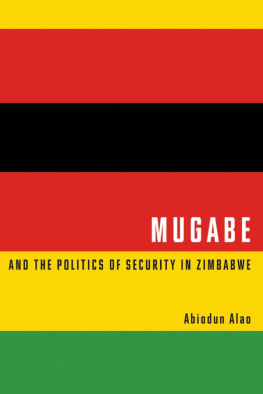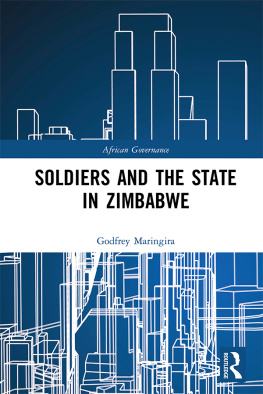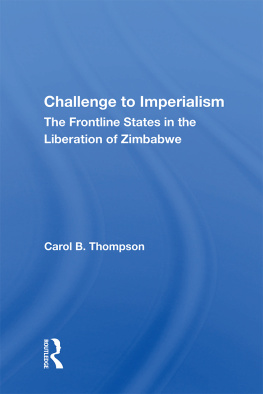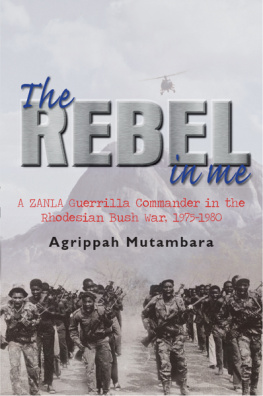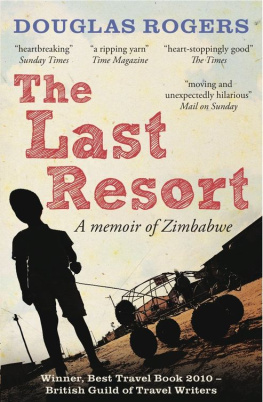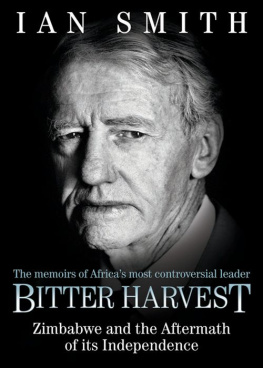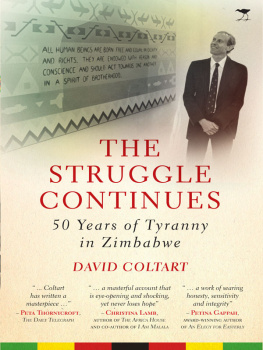Zimbabwe:
Struggles-within-the-Struggle
(1957-1980)
by Prof. Masipula Sithole
Copyright
All rights reserved. No part of this book may be reproduced in any form or by electronic or mechanical means, including information storage and retrieval systems, without express permission in writing from the publisher, except by a reviewer, who may quote brief passages in a review.
M. Sithole, 2015
First published in 1979
Second Edition 1999, and
th Independence Anniversary Edition by
Chandiwana Sithole for
Rujeko Publishers (Pvt.) Ltd
29 Northwood Rise
Mt. Pleasant, Harare
Zimbabwe
c/o chandi.sithole@gmail.com
ISBN 0-7974-1935-7
Typeset by Chandiwana Sithole, 8 Procoki, Gombe, Kinshasa, DRC
CONTENTS
DEDICATION
(from 2 nd Edition)
I rededicate this work to my brother Ndabaningi Sithole whose central role in the struggle and in the struggles-within-the-struggle made it possible for me to see a lot at close range, and whose vision for a future Zimbabwe I shared; and to my late nephew, Felix (Tichadya Mafutaenyika) and to his comrades who fell on account of the struggle anti struggles-within-the-struggle; and to Edson Sithole who disappeared mysteriously on account of the struggle or struggles-within-the-struggle, and to the late Herbert Chitepo whose death on account of the struggles-within-the-struggle inspired the writing of this book.
Masipula Sithole
Harare
March 1999
For Chandi and Masi,
and my students who
have kept my eyes,
ears and mind open.
PREFACE
(from 2 nd Edition)
I wrote the first edition of Zimbabwe: Struggles-within-the-Struggle in the late 1970s during the liberation struggle. For a long time I had wanted to write this book. Although my preoccupation outside my studies and teaching responsibilities at the University of Dayton in the United States had been on the question of national liberation in Zimbabwe, about which I always had strong views, I hesitated to detail these thoughts publicly in the form of a book. The hesitancy stemmed from the fact that each time I came near writing, three considerations came to mind.
First, I had wondered if my readers, particularly those among my countrymen, would take my views and intentions in the right spirit. Second, I had often wondered whether what I said would add to or subtract from the confusion and profusion that already existed regarding internal conflicts in the Zimbabwe liberation movement. And, third, I often agonized over the question whether views so expressed (particularly if they turned out to be mistaken and unpopular), would not have an adverse effect on my brother, Ndabaningi Sithole's political career, since he was immersed through and through in the question of national liberation in Zimbabwe.
In African politics and maybe in politics everywhere, the third factor has a lot more weight than it deserves. I am an individual, Ndaba is another. But, of course, it is not that simple.
Having finally resolved the issue and adopted a "too bad" attitude concerning the first two considerations, I could not however, in good conscience ignore the fact that a work of this nature, like any on the topic, might have adverse effects on Ndaba's political career. It is for this reason that I wrote Ndaba the following letter:
2021 Hazel Avenue
Dayton, Ohio USA 45420
January 21, 1977
My dear Ndaba,
I am writing with regards the enclosed manuscript, Zimbabwe: Struggles-within-the-Struggle, which is an analysis of the major contradictions in our struggle for national liberation and my views on how to overcome, or at least minimize these contradictions to a comfortable and operational degree today and in the future.
I realize the pressure of work you are currently under, but I hope that you can have a night or two to quickly read through every sentence in this work and give it an additional night of thought for much is at stake to publish work that could be politically untimely. Please send your reactions as soon as possible. Greetings and be safe.
Your loving brother,
Mas
To which I got the following reply:
Oyster Bay Post Office
Box 23000
Dar-es-Salaam, Tanzania
February 5, 1977
My dear Mas,
Thank you ever so much for your letter of January 21, 1977. Although I haven't as yet had the opportunity to read every sentence in the manuscript (to be honest I have read only the table of contents, which I must say, I find intriguing, and the first two paragraphs), I feel I must reply you all the same right away.
Now, you see Masipula, in the free Zimbabwe that I envision, there will be a free press, a free circulation of literature and ideas - in other words, freedom of expression. You have a point of view you want to express in a book, express it and damn the consequences. I will oppose here and now, the suggestion made by my own brother that I should censor the expression of his political thought!
Seriously though, Mas, you and your generation must begin to formulate and express your views on all and every issue. My generation is on its way out whether we like it or not. We have done our part, at times not as well as we might have liked to. I am happy to see you are thinking, and on a pertinent subject at that. Go ahead and send the manuscript to the publishers. I will send you detailed comments on it, but you shouldn't wait for them. I would be disappointed if you were to change anything on account of my comments, particularly with regards to my political career.
Good luck. Love and regards to Alice, Jania, Makayeni and Chandi. Keep me informed on the progress of the manuscript. It sort of gives me a funny thrill to know my brother may be a writer like his brother.
Your loving brother,
Ndaba
But Ndaba's remarks did not end my anxieties. The subject about which I was writing is a sensitive one and I was writing it sensitively. I was aware that if what was defined as "my side" lost and "they" won, I was probably going to face the firing squad by those who would have followed the so-called "correct line," who would have found what was said here in bad taste. This would have been tragic. However , this work is about a human tragedy in the struggle. "Tragic" because the whole purpose of this exercise would have been defeated. The intent, the aim, the purpose here was to attempt to show where we went wrong, and where we were going wrong, how and why. The hope was and still is that we will not readily follow that route in the future or if we are going to follow it, we at least don't do it blindly. If the point is understood, I would not face the firing squad because if the struggle was correctly won, nobody should have lost, including the losers.
The point is that we failed to properly handle and resolve contradictions in the internal struggles in the liberation movement. We pursued a "winner-takes-all" and "loser-loses-all" approach to the resolution of conflicts and in pursuing our goals. Politics has been perceived as a "zero-sum-game," as it were. We have not considered both the winner and the loser as part of the same family, which in truth they are. This point is vital. It has a bearing on the Zimbabwe we hoped to establish, administer and regulate. As a people and as a nation, we will continually face internal contradictions. They are a perennial part of the body politic. Unless we have a formula or sets of formulas for dealing correctly with contradictions (both internal and external), we are doomed to live in a society or polity where life, as described by Hobbes is, "nasty, brutish and short."
I do not pretend to have formulas in this small work. However, it is a conscious effort in search of provisional formulas. At least I hope it will be a modest contribution toward this effort. We cannot, forever, continue blindly as we have done in the past.
Next page

